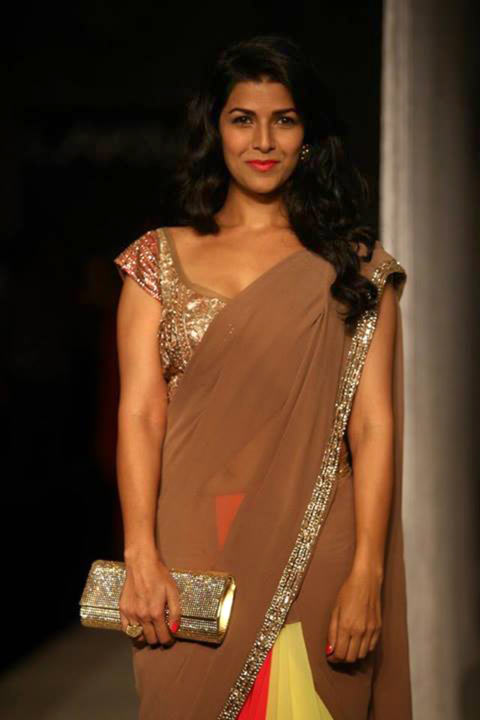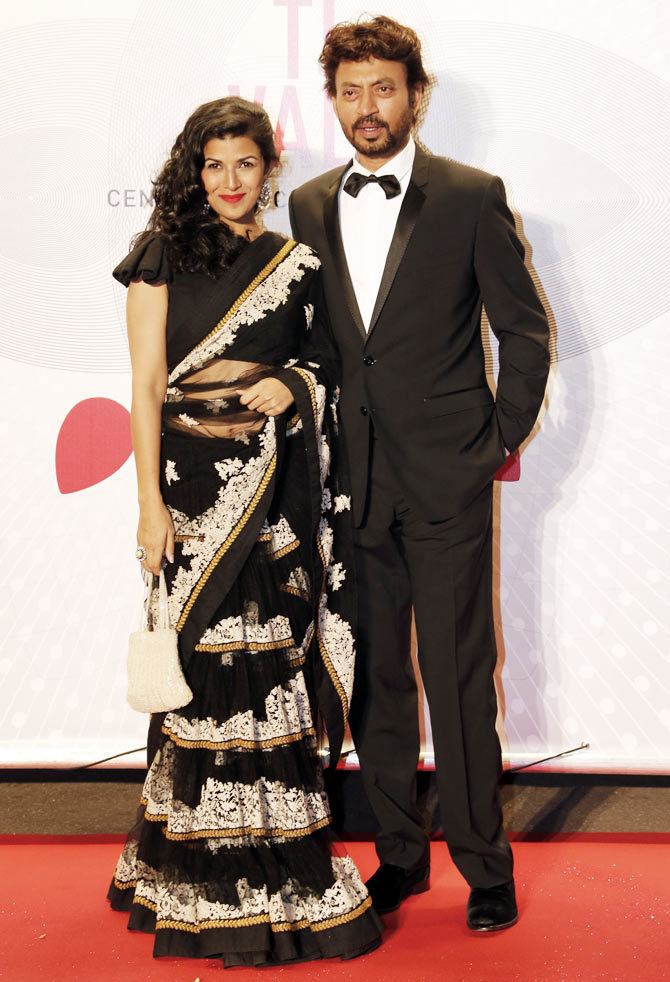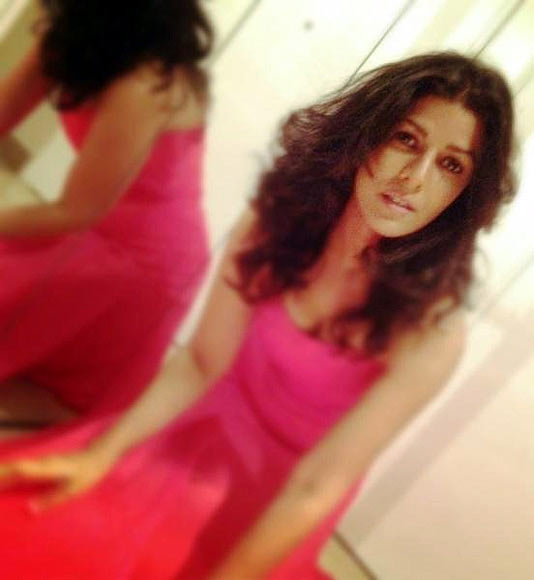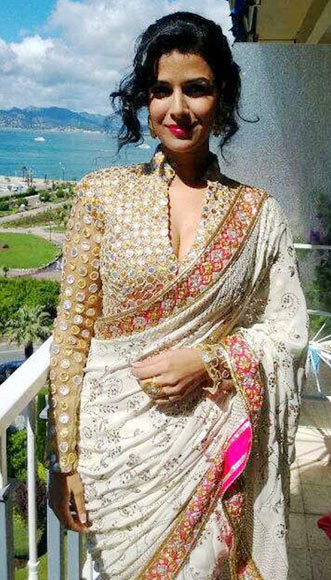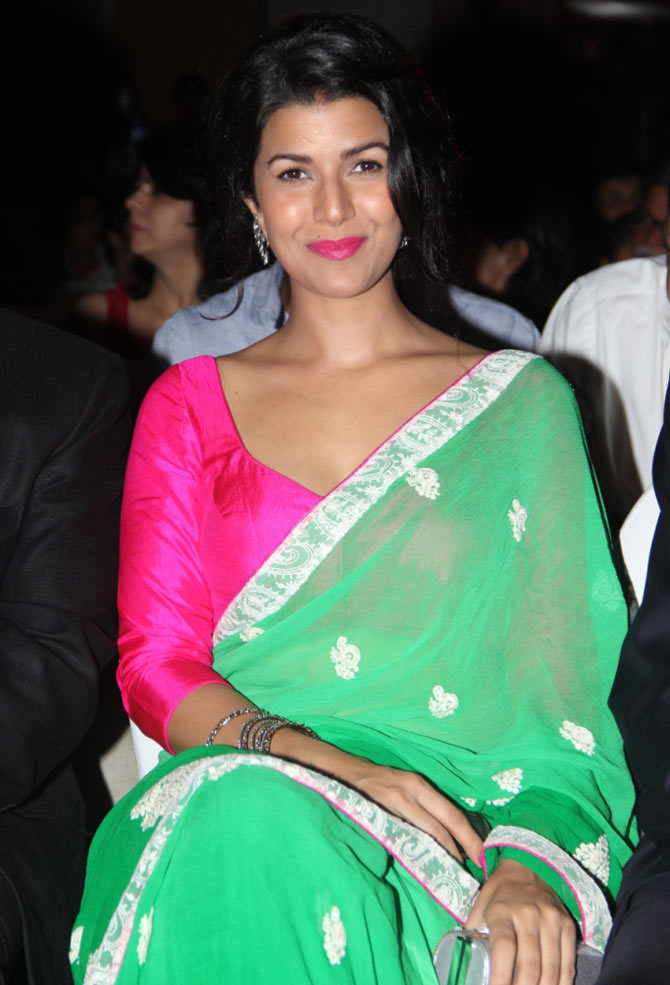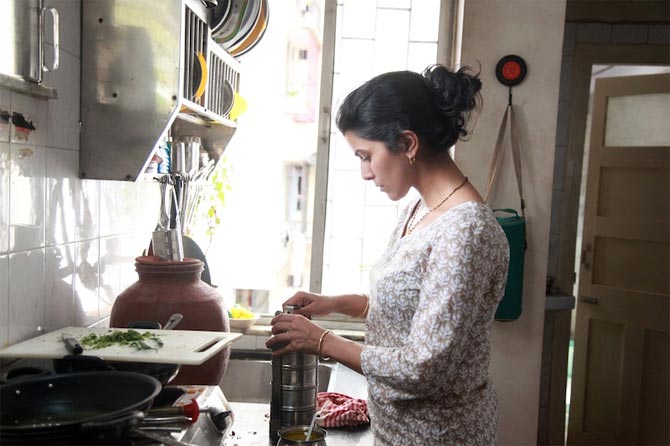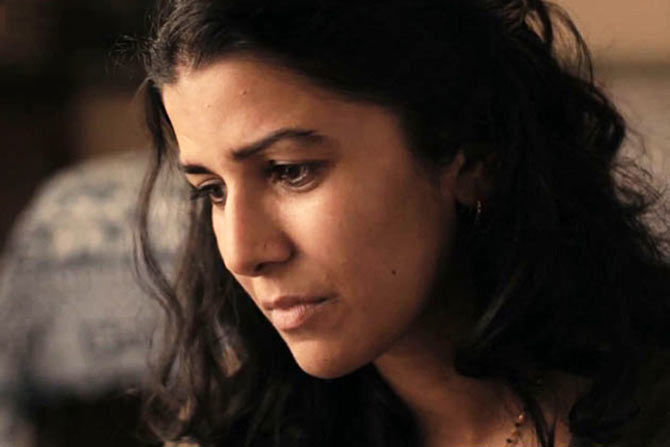 | « Back to article | Print this article |
Nimrat Kaur: The Lunchbox is not a film; it's an event
'I want the next film to be worth all the acceptance and praise The Lunchbox has brought me.'
Nimrat Kaur hasn't signed her next film yet, but she's loving every minute of her exciting career so far.
Nimrat Kaur shoots a cursory glance at the first part of her interview while chatting with Rediff readers and quips, "Now I can't buy a Jaguar ever."
Sitting in a suburban Mumbai cafe, the actress-model is sipping coffee and making small talk as her fingers move diligently on the laptop.
She takes each question into consideration, and makes it a point to respond to the longer ones, 'They've put so much effort in writing all that,' she reasons.
The questions range from the predictable, 'Will you do item numbers?' to the more well-informed, 'What kind of dilemmas are you faced with when you read a new script?' but the answers are all uniformly honest and thoughtful.
In this second part of the interview with Nishi Tiwari, Nimrat sheds some light on her life between her first music video Tera Mera Pyar and The Lunchbox, discusses the difficulties of internalising a character like Ila and paints a curious picture of madness that is the Cannes Film Festival.
What did you do between Tera Mera Pyar and The Lunchbox?
I worked in a lot of commercials and plays.
While commercials were lucrative, I got to perform in some very interesting plays when I started theatre six-seven years ago.
They weren't commercially viable projects but they were helmed by some of the best minds in theatre.
How did Peddlers happen?
They were looking for a girl to play the love interest of one of the six protagonists.
They approached me a little hesitatingly because they were under the impression that I was some snooty theatre actor who wasn’t interested in films.
But Vasan (Bala, the film's debutant director) was kind enough to meet me and I really wanted to work with him.
Please click NEXT to read further.
'Cannes is pretty harrowing if you aren't part of the jury'
You first went to the Cannes Film Festival with Peddlers in 2012, where it was screened in competition. What was the experience like?
Cannes was gorgeous.
I didn’t have a team of assistants back then so I personally wrote e-mails to designers whose clothes I wanted to wear and some of them were kind enough to send over some outfits.
The overall atmosphere there is extremely chaotic and crazy, but I loved every bit of it.
Just how chaotic does it get during the festival?
It’s madness! There are traffic jams because everybody is arriving at the same time at the same venue; trying to find a cab there is humanely impossible -- it’s a logistical nightmare of an unimaginable level.
It’s pretty harrowing if you aren’t part of the jury.
How so?
See, the whole thing works on hierarchy. After the jury, there are other sections at the festival, including the Palme d’Or, Un Certain Regard, Critics’ Week and so on.
So basically how well you’re taken care of depends on which category your film is being screened in (Peddlers screened in the International Critics’ Week segment, an independent event that runs parallel to the main film festival).
'Peddlers is a very difficult film to put out there'
How did the Cannes audience respond to Peddlers?
It was okay. I mean they weren't exactly blown away but we received a warm response.
They were surprised to see that kind of film coming out of India.
It was a great feeling at the end of the day considering the kind of trouble Vasan went to, to make the film – shoe-string budget, no stars in the film, shooting in locations without permit, my clothes were my own.
What kind of locations did you shoot in that required permits?
There was this one steamy scene between Gulshan (Devaiah) and me that we were supposed to shoot in a cab and we were taking U-turns on a back road in Lokhandwala.
There were cops around and we had to wrap it up fast before they noticed us.
Another time, there was a very important scene set in a café and there was a loud baraat passing by. It was quite tough to shoot because we were using sync sound.
Another critical scene was shot in an alley known as cocaine gali.
Is Peddlers going to release in India?
I don’t think so because it’s a very difficult film to put out there. It’s got its limitations in terms of its target audience. It may have an online release.
'I just let myself go a bit to give Ila a sense of being neglected'
How did you prepare for The Lunchbox?
I spent three-four months with the script. Ritesh and I used to meet every few days to discuss it, rewrite some stuff.
On a personal level, I just let myself go a bit to give Ila a sense of being neglected from inside as well as outside.
I cut back a little on my social life and tried to de-clutter my mind, creating a vacuum for myself to play the character.
How was The Lunchbox received at Cannes?
Oh, it was an overnight success. People on the roads were talking about it. It wasn't exactly touted as a frontrunner for Camera d’Or or anything, but we were overwhelmed with the response.
It was one of the fastest selling films that year. At least five people got up in the middle of the screening, which made us quite nervous at first.
We got to know after asking around that those people got up to go and buy the film, while the film was going on!
'While in college, I'd figured out a way to make money when I was bored'
How did you get by when you first moved to Mumbai?
I had some savings.
While in college, I’d figured out a way to make money when I was bored -- I would host events in the South Extension market and in Greater Kailash (suburbs in New Delhi), conduct road shows in college, corporate events and stuff like that.
I’d done a musical with Roshan Abbas when Toyota Qualis was launched. I was paired opposite Sameer Kochchar in it.
When I first moved here, I lived with relatives for the first six months and later got a place of my own in Santa Cruz (a western Mumbai suburb) where I continue to live.
You made your debut at awards shows this year but The Lunchbox got the royal snub at all of them.
I look at it as an opportunity to dress up really well and have a good time with people who are close to you.
My younger sister Rubina flew in from Bangalore for one awards event and mum joined me for another one.
But I guess there’s always that acceptance speech in your mind that you dream of delivering, but it’s okay if you don’t get to do it.
You just congratulate the winner and say ‘better luck next time’ to yourself.
In the end you have to take it with a pinch of salt really because your film has already done what it had to do.
'The DoP had to be on top of the kitchen counter with the camera!'
How did your mother and sister react when they saw The Lunchbox?
My mum was really surprised; she couldn’t fathom why anyone would want to cast me in a film starring actors like Irrfan and Nawaz. Yeah, she really keeps me grounded (laughs).
But she loved it and was surprised that I had a little more than a two-minute scene in the film!
She’s also happy because people around her have liked it a lot to.
The Lunchbox is not a film; it’s an event that you hope occurs at least once in your acting career.
My sister is someone you want to stay away from if you want to remain grounded. She just couldn’t stop gushing about my performance in the film.
She’s the kind of person one needs to ring up whenever they’re feeling low.
You spent a lot of time internalising Ila’s loneliness and forlorn disposition. Even the house she lives in is cluttered in a very depressing way. Did all that affect you on a personal level?
It was tough!
The film was shot in all of 31 days, out of which I worked for 19 days.
It was September and the kitchen used in the film was so small that the DoP (director of photography) had to be on top of the kitchen counter with the camera!
There was absolutely no space for lights in there and the only source for it was the kitchen window. It would get hot as hell with sweaty men around in that tiny space.
I think a lot of that depression stemmed from that.
'There were no instructions about what Ila should look like'
You clearly look nothing like Ila in real life. How did you get all those tiny details about her appearance? Was it part of the character brief?
The script just described scenes and a hint about the characters' cultural backgrounds. There were no instructions about what Ila should look like.
It was all me as far as Ila’s appearance is concerned. Reading the script I realised that there were going to be a lot of hand shots so I thought of colouring my nails with henna.
I made this back story in my head that may be Ira applied mehndi on her aunty’s head (who lives upstairs and is only present as a voice in the film).
It was just a little detail but it brought a kind of rawness to her in my mind.
So there was that and many other things I was constantly asking Ritesh about. He completely trusted me with everything. I don’t think he even heard some of the things I said.
What next?
I’m just going to see what happens next. Ideally, I should have signed my next film by now, if not earlier, but I don’t want to rush anything.
I want the next film to be worth all the acceptance and praise The Lunchbox has brought me.
